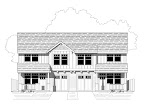Back in December of '09 we reviewed a couple of water heaters that we thought were pretty stylish. The American Council for an Energy Efficient Economy (ACEEE) has created a chart which looks at operating efficiencies and lifetime costs for nine different types of water heaters. We promoted two types of water heaters, one being the high-eff. electric storage, the other being a heat-pump water heater (HPWH). We were impressed by both. The ACEEE study shows the HPWH to be the most efficient unit as well as having the lowest lifetime operating cost. (N.B. that ACEEE lists $190 as annual operating cost while Ruud lists their unit as costing $234 per year. Comparisons made with the average of $212/yr). In fact, compared to a standard electric water heater, the HPWH has a payback period of a little over three and a half years. Even the high-eff. electric has a 3 year payback period over the standard electric tank. After that, though, the HPWH will be ten times cheaper to operate than the high-eff. over the standard electric tank. (Payback period calculated by taking difference of installed costs and dividing by the difference in yearly energy costs.)
Note that if you currently use an oil-fired boiler, you almost can't afford to NOT switch to a new water heater. Even a minimum efficiency electric heater will have a 4 year payback period. If gas is available in your area and you prefer it in case of an electric outage, payback period is about 3 years for a conventional gas heater. Even a HPWH will pay back in 4 years. (Payback period calculated by taking installed cost and dividing by the difference in yearly energy costs.)
Of note is that some state and federal tax credits will offset the cost of a high-efficiency water heater even further making your payback almost immediate. The federal 30% tax credit for energy efficient improvements brings the payback period of a HPWH to less than two years (20 months) compared to a standard electric tank heater.
Istockhouseplans doesn't always designate a space for a water heater within the house (and attached garages in our designs are rare). Therefore we are pleased to see that the HPWH is a high contender for cost and efficiency. These types of units can be put in crawlspaces, basements, and even outside in a milder climate. For colder climates a little attached shed on the side or back of the house would suffice fine. As always, check with your local codes, etc, etc.
Tuesday, January 3, 2012
Subscribe to:
Post Comments (Atom)






No comments:
Post a Comment